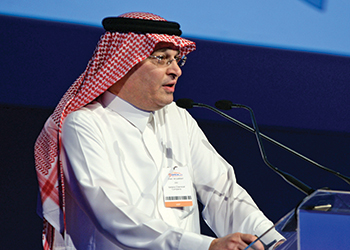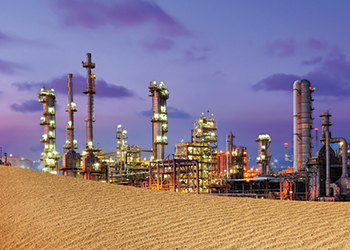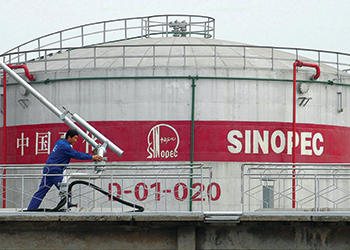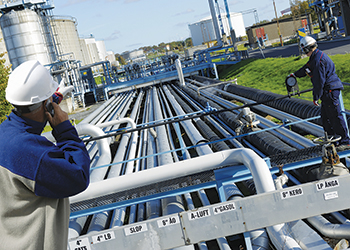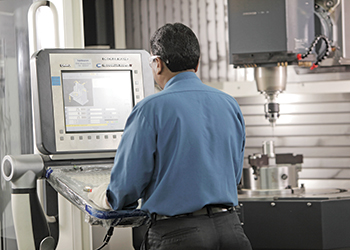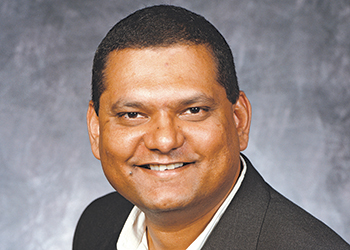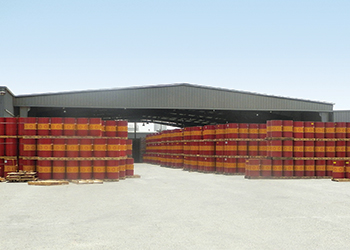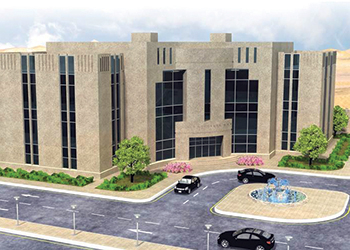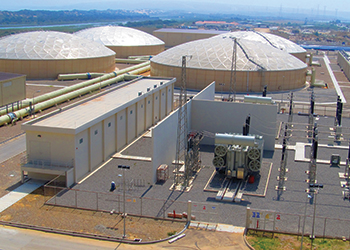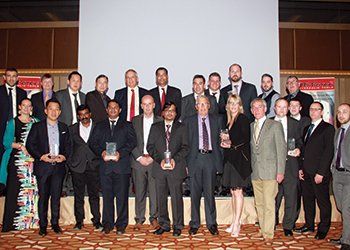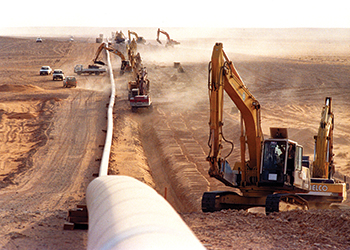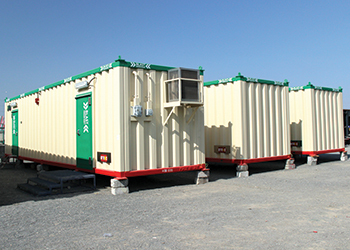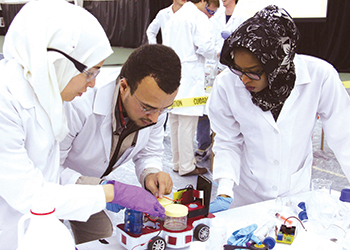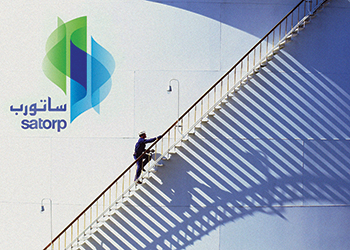
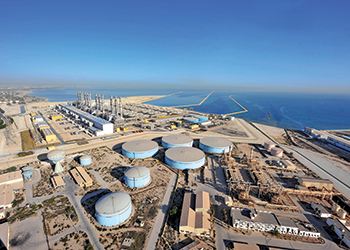 Jubail ... where industries thrive
Jubail ... where industries thrive
Sadara, Saudi Arabia’s prime initiative to support industrial diversification by extending key value chains downstream, will significantly boost the contribution of the industrial cities of Jubail and Yanbu which together makes up 12 per cent of the kingdom’s GDP
The volume of investments injected into Jubail, Yanbu and Ras Al Khair industrial cities has reached SR1 trillion ($266.54 billion), says Prince Saud bin Abdullah bin Thunayyan Al Saud, president of the Royal Commission for Jubail and Yanbu (RCJY).
The commission has captured 65 per cent of the GCC industrial investments, he says adding that RCJY is playing a pivotal role in attracting industrial investments.
The industrial projects in the RCJY cities are producing nearly 10 per cent of the global petrochemical products and are contributing 12 per cent of the kingdom’s gross domestic product (GDP), he says.
A royal decree has been issued to include areas located in the southern parts of the city (420 square metres (sq m) within the future expansion areas of the city that will bring the total area of the city to 606 sq m.
The Yanbu industrial city is witnessing the biggest sea water front on the Red Sea that will include residential areas, hotels and health facilities that will benefit not only Yanbu but the whole country, he says.
The Royal Commission of Yanbu (RCY) CEO Alaa Nasif says investments inflows in Yanbu reached SR193 billion by the end of 2014, of which SR26 billion and SR167 billion belong to government and private sectors, respectively.
The RCY plans to market a number of residential and commercial investments in the city to the private sector companies with values exceeding SR1.8 billion, he says.
Meanwhile, Sadara, Satorp and Sabic dominate projects in Jubail as the industrial city moves to create more value to Saudi Arabia’s upstream hydrocarbon sector, more volumes, more jobs and more income for the kingdom.
Sadara, the joint venture between Saudi Aramco and Dow Chemical Company, is set to become operational in 2015, while it was anticipated that that would happen earlier. But Khalid Al Falih, chairman of the Saudi partner, explains: 'The project is nearing completion. Although there is now a little way to go, it is important to work slowly and at a steady pace to ensure the success of the project. This requires greater determination and a higher level of cooperation from all partners in the project.'
He went on to provide statistics not many outside the project circle knew: concrete and more than 160 tonnes of steel enough to build three causeways the size of the Saudi-Bahrain link will have been used plus some 2,500 km of pipes, roughly the distance between Jeddah and Jubail.
Sadara, the kingdom’s prime initiative to support the kingdom’s industrial diversification by extending key value chains downstream, will significantly boost the contribution of the industrial cities of Jubail and Yanbu which in 2013 together made up 12 per cent of the kingdom’s GDP and 65 per cent of its industrial output while also having 85 per cent of its production exported.
Jubail Industrial City-2, scene of current investments, has already attracted more than $111 billion.
The Saudi Aramco-Dow venture represents the world’s largest integrated complex ever built in a single phase with 26 manufacturing units, over three million tonnes of annual capacity and an investment of about $20 billion.
Saudi Aramco is expected to pay more attention to petrochemicals as global competition builds up in the upstream oil and gas sector.
 |
Thunayyan Al Saud ... presiding over a frenetic pace of growth |
The gigantic Sadara project created a special moment for Almajdouie Logistics Company (MLC), which announced it was assigned to move 10 heavy and abnormal units from Jubail Industrial Port to the Sadara complex. The contract came from a leading Spanish freight forwarder. The heaviest of the columns MLC transported was 601 tonnes, the longest 76 m, the widest 8.5 m and the highest 8.3 m. 'All units were safely discharged on to a trailer using vessel gears and then moved to the nearby Almajdouie laydown area,' reports MLC. Thereafter the columns were delivered to the Sadara site on the basis of a schedule drawn by the EPC contractor Tecnicas Reunidas of Spain. MLC is one of Saudi Arabia’s top logistics providers and an expert in moving heavy and outsized cargo.
Sadara, meanwhile, has contracted Rolta to implement a comprehensive engineering information system within its complex. Rolta will provide a suite of engineering solutions designed to support process engineering, technical systems, process automation and control, asset integrity, analytical lab and standards, and document management.
'Successful implementation of the engineering system is vital to the support and efficient operation of the Sadara Complex,' says Taher Nemer, project manager of manufacturing and engineering systems, Sadara Project. 'We have partnered with Rolta on this challenging project because they’ve demonstrated the breadth of their sophisticated engineering IT expertise and have proven global delivery capabilities that are required.
Earlier, ABB won a prestigious contract to provide operations management software for Sadara.
Another project of no mean proportions, the Saudi Aramco Total Refining and Petrochemical Company (Satorp), built at an investment of $12 billion, marked a happy milestone earlier last year when it achieved full capacity of 400,000 barrels per day (bpd) after a commissioning programme of 11 months. Marking the occasion, Total remarked that the new Jubail 2 refinery would benefit from strong economics and operate for another four to five decades. The facility will use Arabian Heavy produced from the Safaniya and Manifa fields, north of Jubail, and delivered by pipeline directly to the complex. Part of what Total meant by strong economics became clear when Total’s CEO Patrik Pouyanne says: 'We designed the refinery to handle this one type of crude, allowing us to optimise operations and giving Jubail a big advantage in operational reliability.'
Sabic, one of the dominant players in Jubail Industrial City, continues to figure prominently in developments concerning the city. An expansion of the Sadaf plant it planned with Royal Dutch Shell, a partner in the plant, was abandoned as feasibility study results were not encouraging. A Shell spokesman commented though that both parties were open to discussing other business opportunities.
But Sabic is making up for that abandonment by progressing in two plants it is constructing in Jubail. One of them will produce POM (polyoxymethylene) at National Methanol Company (Ibn Sina), Sabic’s joint venture with Celanese Corporation and Duke Energy. The other plant will manufacture PMMA (polymethyl methacrylate) and methyl methacrylate (MMA) monomer under a joint venture – Saudi Methacrylates Company – formed with Mitsubishi Rayon Company.
POM and PMMA are said to offer high-performance solutions for metal and glass replacements, leading to weight savings and higher added value while responding to broader sustainability levels.
Sabic is expanding its Technology Centre in Jubail Industrial City. It is constructing a building adjacent to its existing centre. Sabic says the project will strengthen R&D in chemicals and fertilisers and help it explore market opportunities.
Another chemical producer on the ascendant, Sipchem, announced its plastics plant in the city will begin start-up operations soon. The plant will manufacture up to 63,000 tonnes annually of PBT (polybutylene terephthalate) resin a year. The resin is used as feedstock for products developed by automotive, electrical and IT companies. Sipchem aleady makes butanediol, which will be used in producing PBT.
 |
Sabic ... leading Jubail’s progress |
Away from refineries and chemical facilities, ArcelorMittal Iron and Steel Company took the first step in its plans to have a strong presence in Saudi Arabia. It started commercial operations at its plant in Jubail 2 which has annual capacity of 600,000 tonnes with investment in excess of $1 billion. Most of its production will be used for tubular items and the remainder for pipelines. 'The project represents a connection with the mother company and its subsidiaries around the world. It decided to divert its investments toward the Saudi, Gulf and the Middle East markets to produce iron and steel and its derivatives to meet the growing demand in the region,' a senior official of ArcelorMittal said at the time it began operations.
'The production targets new projects, especially in Jubail and meet the needs of the kingdom and Gulf countries of oil and gas pipes in multiple types and sizes.' The plant is a joint venture between ArcelorMittal and Al Tanmiah Company for Industrial and Commercial Investment. Even as major projects are planned or under way at Yanbu Industrial City, a strong campaign has kicked off to draw more foreign investors to the city.
Dr Alaa Nassif, the chief executive of the Royal Commission at Yanbu, led a team at a roundtable in Houston, Texas, US, recently, to share information and communicate prospects for business in the Red Sea hub to a group of US companies.
Yanbu has developed mainly as a refining and petrochemical hub over the past 40 years but it wants to diversify into other sectors in a more significant way. Yanbu is targeting such industries as chemicals and plastics, packaging, desalination, energy, motor vehicles, fabricated metals, specialised glass and logistics. Royal Commission officials apprised the Americans about infrastructure support, financial incentives, the availability of key feedstocks, and markets.
The Houston roundtable was organised by the US-Saudi Arabian Business Council (USSABC). 'Yanbu’s competitive package of land, utility and infrastructure services coupled with its access to Middle Eastern, European, Asian and African markets makes it a must for consideration for any international firm looking to expand its footprint in the region,' its CEO Edward Burton stated.
Dr Nassif has said investments at Yanbu Industrial City were $40 billion in petrochemicals, refining and desalination and expectations were that another $21 billion would come in by 2020 for new hydrocarbon downstream projects including autoparts and for a minerals hub. A shipbuilding yard is also in the planning stage. The city now hosts around 33 hydrocarbon, petrochemical and mineral industries and 50 light manufacturing and support industries. Another 65 industrial projects are in various stages of planning and construction.
Industrial sites occupy nearly two-thirds of the city’s 185 sq km and an expansion will allow administrators to release another 185 sq km.
The city has already witnessed hectic activity with more to come. Just built is a 400,000 bpd refinery jointly owned by Saudi Aramco (62.5 per cent) and China’s Sinopec, which holds the remainder share. Tests runs are under way and commercial operations are likely to begin shortly. The refinery will export an overwhelming portion of its production to markets including Europe and Asia.
By July of 2015, an expansion at the Yanbu refinery of Saudi Aramco Lubricating Oil Refining Company (Luberef) will be completed. Samsung Engineering has the EPC and commissioning contract to set up a hydrocracking unit of 23,000 barrels per day, an ISO-dewaxing complex and a hydrogen manufacturing sulphur recovery complex of capacity 95 tonnes per day, among other facilities such as substations and cooling towers. Annual capacity at Luberef will rise from 280,000 tonnes to 710,000 tonnes of base oil.
Saudi Aramco operates in Yanbu two other refineries, including one with Exxon Mobil (Samref), and a crude oil terminal. The petrochemical ventures in Yanbu include four Sabic affiliates – Yanbu, Yanpet, Yansab and Ibn Rushd (the Arab Industrial Fibres Company) – and a polypropylene plant operated by National Petrochemical Company (Natpet).
A new plant for manufacturing polypropylene compounds, fruit of a joint venture between Natpet and US firm A Schulman, is nearing completion in the city. The joint venture will manufacture a line of customer-preferred engineered plastic compounds based on A Schulman’s highly regarded technology. Natpet, a well-established petrochemical producer in the region, will provide the joint venture with its regional infrastructure as well as its high-quality polypropylene resin.
Samref is a JV between Saudi Aramco and Mobil Yanbu Refining Company, a wholly owned subsidiary of ExxonMobil Corporation.






































































